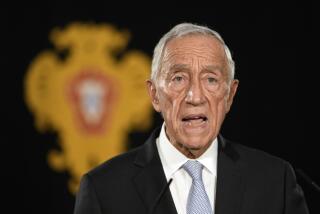Da Palma Carlos; Led Portugal Into Democracy
- Share via
LISBON — Adelino da Palma Carlos, Portugal’s first prime minister after nearly half a century of ultraconservative dictatorship, died Sunday after a long illness. He was 87.
Da Palma Carlos, a constitutional lawyer, was appointed prime minister by President Antonio de Spinola in 1974 after a bloodless revolution led by leftist army officers who overthrew the dictatorship of Marcelo Caetano. He and a handful of other centrist members resigned after a few weeks, however, demanding additional powers.
Lt. Col. Vitor Goncalves, a member of the revolutionary council set up after the coup, told Lisbon’s TSF radio that Da Palma Carlos was a “great patriot” and was considered the man who led Portugal’s transition from a one-party state to multiparty democracy.
“As our first prime minister after the April 25 (revolution), we had total trust in him to initiate the way toward democracy,” Goncalves said.
Da Palma Carlos’ provisional government included Portugal’s current president, Mario Soares, then a Socialist, who had the foreign affairs portfolio, and Alvaro Cunhal, leader of the Communist Party.
Da Palma Carlos saw his job as prime minister to “establish the legal basis for his provisional government and to normalize public life,” which involved creating a constitutional basis for Spinola’s presidency, said Walter C. Opello Jr. in his recent book, “Portugal: From Monarchy To Pluralist Democracy.”
But this proved impossible in the turmoil that followed Portugal’s revolution, and, after just 56 days in office, Da Palma Carlos resigned.
An opponent of independence for Portugal’s African colonies, Da Palma Carlos argued that the president should have the mandate of a national election behind him before deciding the independence question.
More to Read
Sign up for Essential California
The most important California stories and recommendations in your inbox every morning.
You may occasionally receive promotional content from the Los Angeles Times.













